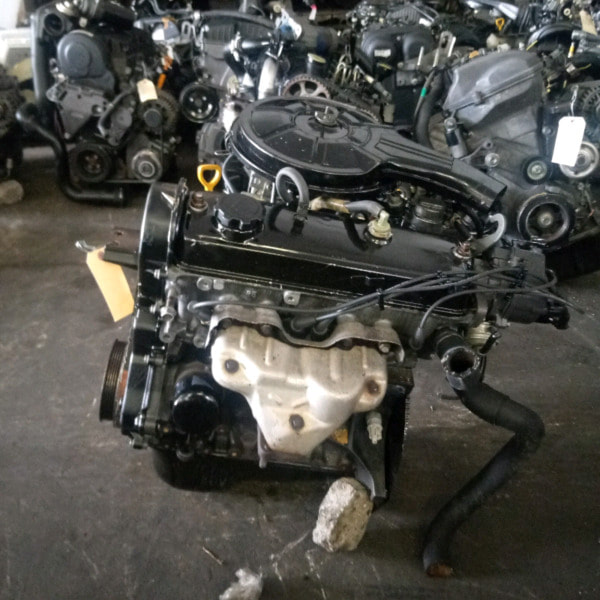Upgrade Your Automobile's Heart: Toyota Tazz Engine for Sale, High Quality Ensured
Upgrade Your Automobile's Heart: Toyota Tazz Engine for Sale, High Quality Ensured
Blog Article
Engine Buying Professional Tips on Picking the Right Engine for Your Details Requirements
Selecting the best engine for your details demands entails an intricate interaction of elements that exceed simple horsepower numbers. From power output to fuel efficiency, the decision-making process can be discouraging. Understanding the nuances of engine kinds, dimensions, and their compatibility with your lorry is essential. There are professional pointers that can aid navigate this terrain with confidence. By delving into the details of power versus effectiveness, assessing fuel ratings, and budgeting for lasting prices, one can absolutely maximize their engine selection.
Power Vs. Performance: Finding the Balance

When choosing an engine, it is critical to strike a balance in between power and effectiveness to meet your specific demands effectively. Power refers to the engine's capacity to generate power for propulsion, determining aspects like velocity, towing capability, and total performance (Toyota Tazz Engine For Sale). On the other hand, performance associates with how well the engine makes use of gas to generate power, impacting elements such as gas economic situation and ecological kindness
Achieving the appropriate equilibrium in between power and effectiveness is necessary since an engine that is too effective might consume extreme fuel, resulting in higher operating prices and unnecessary strain on the atmosphere. Conversely, an engine that prioritizes effectiveness over power might cause sluggish performance, specifically popular situations like hauling heavy tons or driving uphill.
To make an informed choice, consider elements such as your normal driving problems, the designated usage of the car, and your individual choices. By reviewing your top priorities and needs, you can pick an engine that strikes the ideal balance in between power and performance, making sure optimal performance while lessening ecological influence and operating prices.
Comprehending Engine Size and Kind

Usual engine kinds include inline engines, V engines, and rotary engines, each with its unique benefits and disadvantages. Comprehending the interplay between engine dimension and type is important in selecting an engine that straightens with your certain requirements and priorities, whether it be power, performance, or a balance of both.
Consider Your Vehicle's Needs
Considering your automobile's requirements is a basic action in the engine option process to make sure optimal efficiency and functionality. It is important to review elements such as the intended usage of the vehicle, its weight, lugging capacity, and gas effectiveness demands. As an example, if you are seeking an engine for a durable vehicle that will be made use of for towing, you will certainly need an effective engine with high torque capabilities. On the other hand, if you are picking an engine for a compact automobile largely used for city commuting, gas performance may be a much more essential continue reading this element to think about.

Examining Gas Performance Ratings
Examining gas performance scores is an important element of choosing the best engine for your car, guaranteeing cost financial savings and ecological sustainability. Gas effectiveness ratings, typically gauged in miles per gallon (MPG) for gasoline engines or kilowatt-hours per 100 miles (kWh/100 miles) for electrical engines, indicate just how much a vehicle can travel on a specific quantity of gas or electricity. Greater MPG or lower kWh/100 miles values signify extra reliable engines, equating to reduced gas expenses and lower carbon exhausts.
Furthermore, compare various engine choices within the very same lorry course to determine the most cost-effective option. Elements such as engine dimension, weight, the rules of aerodynamics, and crossbreed or electric capacities can all affect fuel effectiveness.
Budgeting for Long-Term Prices
Purposefully intending for lasting expenditures is important when choosing an engine, making sure monetary sustainability over the car's life expectancy. While the preliminary purchase cost of an engine is a considerable aspect, it is vital to take into consideration the long-term costs associated with maintenance, repairs, and fuel intake.
Furthermore, looking into the schedule and expense of replacement components for the chosen engine is crucial in spending plan preparation. By meticulously budgeting for these long-term expenditures and factoring them right into the decision-making procedure, individuals can select an engine that not only fulfills their prompt requirements yet additionally continues to be cost-efficient throughout its life-span.
Conclusion
To conclude, picking the right engine for your specific requirements requires balancing power and effectiveness, comprehending engine size and type, considering your vehicle's demands, assessing fuel efficiency scores, and budgeting for long-term costs. By meticulously taking into consideration these factors, you can ensure that you choose an engine that meets your requirements and provides optimal performance for your lorry.
To better improve the choice process of an engine that strikes the optimum balance in between power and performance, it is crucial to dive right into the ins and outs of recognizing engine dimension and kind. Engine dimension refers to the overall quantity of air and gas that can be pushed through the engine cylinders. Typical engine types include inline engines, V engines, and rotary engines, each with its unique advantages and drawbacks. Recognizing the interplay between engine size and kind is essential in choosing an engine that lines up with your certain requirements and top priorities, whether it be power, effectiveness, or a balance of both.
Fuel efficiency scores, normally measured in miles per gallon (MPG) for fuel engines or kilowatt-hours why not try here per 100 miles (kWh/100 miles) for electrical engines, indicate just how much an automobile can take a trip on a details amount of fuel or power.
Report this page